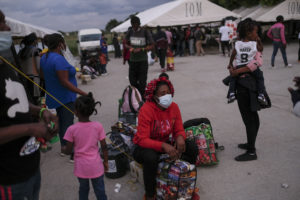Almost seven years after an earthquake devastated it in 2010, Haiti is again confronting a humanitarian nightmare related to one of the most damaging natural disasters in history– Hurricane Matthew. Two weeks before the storm hit, Secretary of Homeland Security Jeh Johnson announced that a new detention and deportation policy would be implemented, and that officials would begin cracking down on Haitians entering the United States.
Until now, undocumented Haitians in the United States were eligible for Temporary Protected Status (TPS), allowing them to remain in the country and work. Secretary Johnson’s announcement was based on the assumption that the situation in Haiti had improved enough since the earthquake for Haitians to return. Now that the country has been hit with the most devastating hurricane it has experienced in the past 50 years, however, the Department of Homeland Security (DHS) should rethink this policy change. Matthew left behind a trail of death, displacement, and destruction of the little infrastructure that Haiti was able to rebuild since 2010. This scenario, combined with continued political instability, extreme poverty and weak institutions that cannot attend to most citizens’ basic needs make Haiti an unsuitable place to return to. While DHS has suspended deportations in the immediate wake of the storm, it has not changed the overall policy.
Secretary Johnson’s announcement[i] came after 2016 saw a surge of Haitian immigrants arriving at the U.S.-Mexico border, many of whom had traveled north via Brazil. The U.S. Customs and Border Protection agency estimates that between 6,000 and 7,000 Haitians entered the United States in 2016,[ii] with the majority requesting humanitarian parole. Under the new policy, DHS will not extend humanitarian parole status to Haitians, and those who wish to apply for asylum will have to do so via the regular asylum process. Others will be detained, placed under expedited removal and deported back to Haiti. Once returned, these people will be left to fend for themselves and face brutal conditions, in which they are unlikely to have dependable access to basic needs like food, medical care and shelter.
Haitians were first granted TPS after the devastating 2010 earthquake that killed over 160,000 people and displaced another 1.5 million. This status was re-designated in 2011 and remains valid until July 2017. However, reports from the ground[iii] indicate that conditions have not changed enough in seven years to warrant the forced return of Haitians. As the poorest nation in the western hemisphere, the United Nations has found that 58 percent of Haitians = live below the poverty line. The Internal Displacement Monitoring Center (IDMC)’s data suggests that nearly 62,000 internally displaced persons (IDPs) are still living in 36 camps set up throughout Haiti in the aftermath of the 2010 earthquake[iv].
Political instability continues as the country is being run by an interim government, after President Michel Martelly resigned in February of this year. Elections were set to occur in April, but were postponed to October 9. Then, Matthew arrived to hit a barely-recovering nation, and the election was again postponed to November 20[v]. Although numbers vary, some reports suggest the hurricane left behind upwards of 800 casualties[vi], thousands homeless, and a potential for disease outbreak due to poor sanitation. In addition, violent protests have erupted throughout the country among people desperately trying to access humanitarian aid[vii]. People are dispirited and frustrated with their country’s situation, and there are no immediate solutions in sight.
The reality is that conditions in Haiti have not improved enough for returnees’ lives to be safe. Yet even setting aside DHS’s erroneous assertion that the country is now able to receive deportees, the policy is deeply flawed. Firstly, it only applies to persons who enter the United States after the September 22 announcement. This means that recently arrived families can be separated, depending on which day they arrived. Second, Haiti has expressed their capacity to receive 50 returnees a month, but 100 detentions of Haitians are occurring every day at the border[viii]. Third, because deportations have been suspended due to the hurricane, detainees who are placed in detention centers throughout the country until deportation can be arranged are being held indefinitely. This means Haitians are being detained with no answer as to when they may be released or sent back. Approximately 3,000 Haitians have been detained under this new policy.
Given the circumstances in the country, Haitians who are sent back have little to return to. As such they are quite likely to become homeless, or live in an IDP camp in insecure and unsanitary conditions without the possibility of employment. If that is the case, it will only be a few months before these same persons regroup and migrate again in search of a better life.
On the other hand, U.S. policies and the limited number of cases that are being processed each day have also resulted in thousands of Haitians temporarily staying in Mexican border cities, particularly Tijuana, representing challenges for the state and local government as well as local shelters to provide adequate services and shelter to this vulnerable population.
The United States would do better to focus on increasing humanitarian assistance, help to rebuild the Haitian economy and infrastructure, address the cholera epidemic, and strengthen state institutions so they can respond to their citizens’ needs. Congresswoman Maxine Waters has pledged[ix] to monitor U.S. assistance to Haiti, as well as the UN’s cholera response. At a time like this the United States must offer its hand in rebuilding and stabilizing a country in distress, rather than exacerbating its problems by deporting thousands of people who are only looking for a chance to live safely.
[i] https://www.dhs.gov/news/2016/09/22/statement-secretary-johnson-concerning-his-directive-resume-regular-removals-haiti
[ii] October 28 DHS Teleconference on Resumption of Regular Removals to Haiti
[iii] Amnesty International Report 2015/16 https://www.amnesty.org/en/countries/americas/haiti/report-haiti/
[iv] http://internal-displacement.org/globalreport2016/
[v] http://www.npr.org/sections/thetwo-way/2016/10/14/497990449/haiti-presidential-election-rescheduled-for-november
[vi] http://www.reuters.com/article/us-storm-matthew-haiti-idUSKCN12719D
[vii] http://www.miamiherald.com/news/nation-world/world/americas/haiti/article112168647.html
[viii] September 22 Telephone NGO briefing on DHS’ Broken Commitment to Aid Survivors of the 2010 Haitian Earthquake (Alliance San Diego, San Diego Immigrant Rights consortium, FAMN)
[ix] https://waters.house.gov/media-center/press-releases/congresswoman-waters-statement-hurricane-matthew



